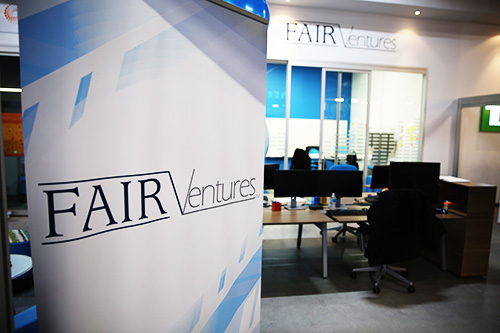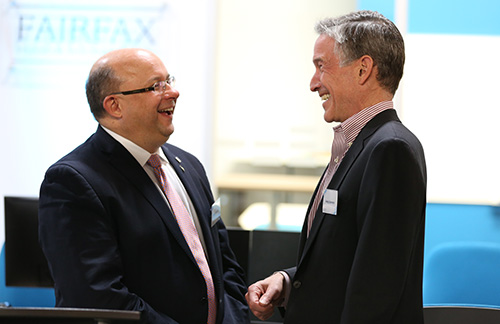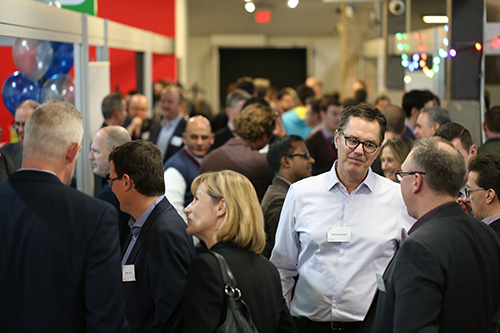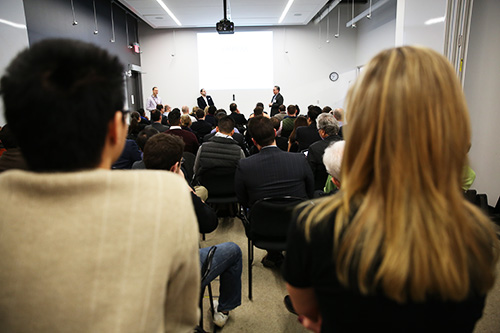FairVentures, an innovation lab by Toronto-based Fairfax Financial Holdings, opened in the Communitech Hub on Monday. Fairfax is a large holding company with a diverse portfolio of investments and about $36.13 billion USD in total assets as of 2014. Fairfax is the latest financial company to use Communitech's corporate innovation model, and Communitech News sat down with the lab's brand new Director, Dave Kruis – himself a fixture of the Waterloo tech scene with over seven years at BlackBerry and four at D2L (Desire2Learn) – to talk innovation.

The brand new FairVentures lab at Communitech (Communitech Photo: Phil Froklage).
Q – Why has Fairfax decided to try Communitech's corporate innovation model?
A – Like any large, multinational corporation, Fairfax is looking at the pace at which technology is influencing business. For a company like Fairfax – with significant investments and holdings in companies across the world in a lot of different industries – it's difficult to really get a handle on all of that.
From Fairfax's perspective, centralizing disruption-prevention activity, particularly here in Waterloo Region at the Communitech Hub, allows the company to get focus around the new technologies, new business models, and new ecosystems that need to be tapped to identify different things – technologies, opportunities, and so on – that can be applied to the verticals in which Fairfax operates.
Insurance is obviously one of the key verticals, and there's been a lot of talk over the last months, even years, that insurance is one of the last industries to be disrupted by tech. We're very cognizant of that. We want to make sure that we disrupt ourselves instead of being disrupted. Having focus here in the community, and engaging with local startups, is key to our success.

Mayor Berry Vrbanovic shares a laugh with Andrew Barnard, President and
COO of Fairfax Insurance Group (Communitech Photo: Phil Froklage).
Q – The insurance industry has been around for centuries. What innovations are you hoping to develop here?
A – It's impossible to answer that. We're looking at all types of technologies, and through two different frameworks. The first framework is technologies and solutions that could positively impact the insurance companies themselves, in terms of their day-to-day operations and how they do work.
The second framework is the potential these technologies have to impact the companies that we insure, the policy-holders. We look at it through both of those approaches. Our customers at FairVentures are insurance companies themselves within Fairfax Holdings, but the end users are often the individuals who drive cars and need car insurance, or own factories and need insurance for that. We're looking at technologies and innovations in both of those markets.
Q – What are your goals for the Fairfax Innovation Lab? What does success look like for you?
A – Well, a few low-hanging-fruit examples of products we're thinking about are mobile apps that help agents or brokers provide better service to customers. We're looking at direct-to-consumer models that will let consumers shop for insurance from the comfort of home. That type of thing.

Communitech’s Partner Space was packed as Fairfax cut the
ribbon on its new innovation lab (Communitech Photo: Phil Froklage).
For risk mitigation, the other framework, we're looking at using the Internet of Things and new connected sensors to monitor all kinds of things, from ships and trains and planes to preventing flooding. It's a big sandbox, a global sandbox that cuts across lots of different industries – restaurants, retail, travel, and so on. Having such a big sandbox to play in is exciting for us, since it also means there are a lot of opportunities for cross-pollination with other companies in the ecosystem.
When it comes to success, we think like a startup. Like any startup, success is deemed by customers. If you don't have customers, you aren't successful. We see this as an opportunity to serve the Fairfax group of companies, and provide value to them in terms of the services we bring. Helping them be more innovative, prototyping things to help them address problems, finding startups that could be great vendors for them... Our success will be measured by providing those solutions and that value to our customers.
Q – Your neighbour TD has spun its Communitech lab into a much larger innovation effort in Waterloo Region. Does Fairfax have similar plans?
A – It’s too early to say. It’s certainly something we would consider. The way we're looking at it now is, again, like a startup. We're lean and agile; we know it isn't about if we can do it but if we should. Right now, we're going to build the lab day by day and if the demand from our customers is high then we may need to answer that demand by expanding the lab. For now, we're looking for early wins, and to amplify them.
Q – What has it been like joining Communitech's innovation ecosystem? Thoughts on the ecosystem itself?
A – I've been involved personally in the ecosystem for years; it's like an extended family for anybody in this region. FairVentures is now an active participant in that ecosystem, and we're really excited about that. Communitech has done a great job of making the whole transition easy; the organization is good at helping established companies leverage what they've built and set up innovation outposts here.
We're lucky to be number five or six, so a lot of the growing pains and testing of the framework is done. We can move right in and have all kinds of services available to us. We're running a collision day tomorrow, there's an industry event the day after that... None of that would be possible without the support of Communitech and that's been immensely valuable.

A crowd of startup leaders from Waterloo Region listen to Dave Kruis’ plans for
the future of insurance at Fairfax Collision Day (Communitech Photo: Phil Froklage).
Q – What's the most surprising thing you've learned through the process of joining Communitech's ecosystem?
A – How well the Fairfax organization has embraced the concept of a lab. In some sense, you might expect a company with the size that Fairfax holds would be – not averse – but unsure if a lab in Waterloo Region is going to help a company in London, U.K., or Brazil. But they have certainly embraced the concept. They're here today to meet with us and startups in the community, because they see value in having a central point for innovation. For the lab to act as an innovation conduit between all these different companies is super valuable. So we're thrilled by the support and expect it will continue for the duration.

